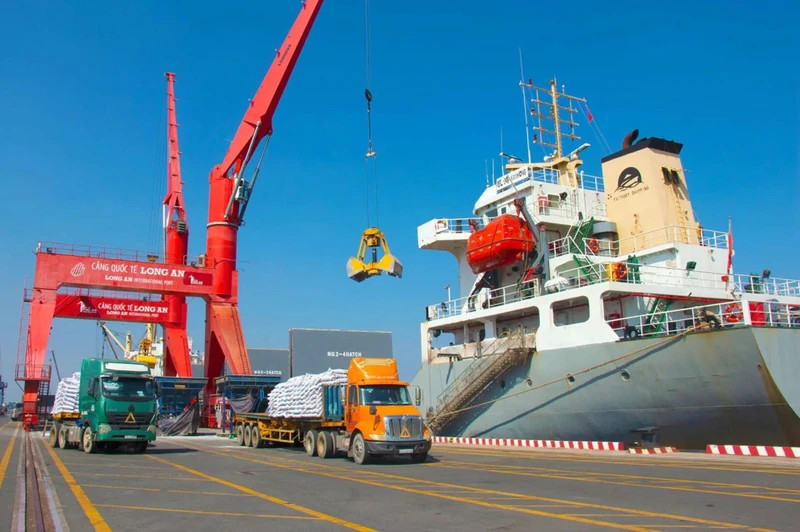However, this "hot" development also entails negative consequences for the environment from logistics services such as packaging processes using plastic, nylon, etc., or goods delivery causing high CO2 emissions.
In the context of the entire economy striving to promote green and sustainable growth, the requirements for e-commerce development are no exception. Specifically, greening logistics in e-commerce plays an important role in protecting the environment and moving towards sustainable development.
Large emissions
Over the past 15 years, Vietnam's e-commerce has maintained an average growth rate of 20% per year, except for the period affected by Covid-19. Vietnam's e-commerce market is considered to be among the top 10 in the world in terms of growth rate and is expected to continue to rise in the coming years.
In that success, logistics plays a very important role because it is an indispensable link to complete orders and transactions. With 43.9 million people participating in online shopping, Vietnam is the country with the highest rate of people participating in e-commerce in Southeast Asia, highlighting that the delivery demand of this industry is always necessary.
However, according to Le Hoang Oanh, Director of the Department of E-commerce and Digital Economy under the Ministry of Industry and Trade, e-commerce is growing rapidly but has been revealing many unsustainable factors related to logistics activities.
In the online retail sector, there are two steps that have a negative impact on the environment: delivery and packaging. Each product delivered from an online store has its own packaging, usually cardboard boxes, nylon packaging, foam boxes, and disposable plastic items.
Every day, thousands of trucks, cars, motorbikes, etc., deliver orders to customers and retrieve unclaimed orders, creating a huge amount of carbon emissions. These impacts are even higher in the case of express delivery.
Chairman of the Senior Advisory Council (Vietnam E-commerce Association - VECOM) Nguyen Thanh Hung said: According to calculations, e-commerce activities in Vietnam in 2023 used 332,000 tonnes of packaging, of which the volume of plastic packaging of all kinds was 171,000 tonnes.
With an average growth rate of 20-25%/year, the scale of e-commerce in our country by 2030 will be more than 4 times larger than it is now, and if there are no strong solutions to change the packaging process, the amount of plastic waste from e-commerce will reach about 800,000 tonnes.
Joining hands to protect the environment
Logistics activities play a key role in the supply chain of e-commerce but are also a source of greenhouse gas emissions and significant environmental pollution. Therefore, "greening" logistics activities is a mandatory requirement for more sustainable e-commerce development.
According to experts, green logistics is a method of managing the supply chain and transporting goods to minimise negative impacts on the environment.
This includes optimising vehicle rotation and transport capacity to reduce empty vehicles and linking transport modes to reduce environmentally unfriendly modes. In addition, “greening” also involves prioritising the use of environmentally friendly materials in product packaging and finding ways to reuse packaging.
In fact, the application of green logistics solutions brings many benefits to businesses and society. According to the Vietnam Logistics Report, logistics costs at retail businesses account for a large proportion of costs, ranging from 10-20%.
In logistics costs, transportation costs have the highest proportion, about 60-80%. Therefore, optimising transportation costs not only helps businesses cut costs but also contributes significantly to reducing emissions from transportation activities.
Green logistics transformation in e-commerce is not only a trend but also an inevitable path for sustainable and strong development. However, this transformation requires close cooperation from businesses, the Government, and consumers to create an effective green logistics ecosystem, thus contributing to environmental protection and improving the quality of life.
Enterprises need to proactively apply green logistics solutions, invest in technology, optimise operations and use environmentally friendly packaging.
Meanwhile, the Government should encourage enterprises to convert to green logistics by issuing support mechanisms and policies, and at the same time build a green transportation system and appropriate infrastructure.
Consumers should support and prioritise enterprises that are committed to protecting the environment, using products with clear origins and environmentally friendly packaging, and join hands to protect the environment with practical actions.
















